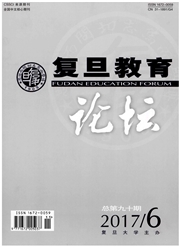

 中文摘要:
中文摘要:
在当下的后工业时代,教师掌控学生学习的知识控制范式悄悄地崩溃,随之而来的挑战是教师必须重新调整他们在学生学习中的角色和定位。然而,值得探讨的问题是,这种调整和改变在现实中是否发生。本文依据复旦大学师生大调查的相关内容,试图追问以下问题:在对教学的认知和体验方面,教师和学生是否存在差异?教师怎样认识他们的教学优点?受到学生认可的教学优点又是哪些呢?他们之间有不一致的地方吗?本文用调查数据对上述问题作出回答,并试图探讨大学教师为何需要持续的专业发展以及需要何种发展模式。
 英文摘要:
英文摘要:
As a result of the paradigm shift in knowledge control, teachers are no longer the absolute authority in classroom settings. They need to change their teaching beliefs and assume new roles to adapt to the change. This paper attempts to investigate whether the change has taken place in reality rather than in rhetoric. Based on the data collected from a large-scale survey conducted among Fudan teachers and students, these questions are specifically explored: Do teachers and students share similar or different perceptions of teaching? How do Fudan teachers define quality teaching? How do students understand them? Any misalignment between them? On the basis of the analysis of the misalignments, the paper concludes with some suggestions on the type of professional development models required by teachers.
 同期刊论文项目
同期刊论文项目
 同项目期刊论文
同项目期刊论文
 期刊信息
期刊信息
